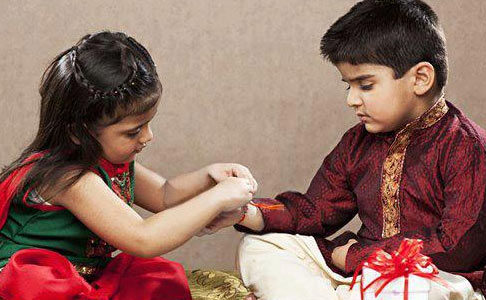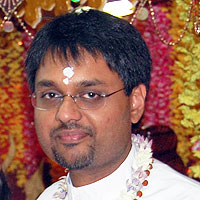 Relationships are the essence of festivities in Hinduism. Almost all Hindu festivals act as a unifying factor in creating closeness in relationships and bringing families, relatives, friends and indeed, the entire community together. The seers of Hinduism created this social system of Rakhsha Bandhan, not only as a festival of the siblings or for the tying of the ‘Raakhi’ and the gift-giving by the brother, but also as a celebration of mankind and of humanity. It is a celebration that binds people together in a display of unifying love and harmony. It speaks volumes about this loving relationship that nurtures, protects and uplifts.
Relationships are the essence of festivities in Hinduism. Almost all Hindu festivals act as a unifying factor in creating closeness in relationships and bringing families, relatives, friends and indeed, the entire community together. The seers of Hinduism created this social system of Rakhsha Bandhan, not only as a festival of the siblings or for the tying of the ‘Raakhi’ and the gift-giving by the brother, but also as a celebration of mankind and of humanity. It is a celebration that binds people together in a display of unifying love and harmony. It speaks volumes about this loving relationship that nurtures, protects and uplifts.
In Hinduism this festival is but one expression of the strength and power wielded by the family unit, the most basic institution of society. The celebration emphasises and renews the close bonds that families share. On this auspicious day, which is usually observed on the full-moon day in the month of Shraavan ( July-August), the sister ties a rakhi (sacred thread) on her brother’s wrist which symbolises the sister’s love and wish for her brother’s well-being. It also signifies the brother’s lifelong vow to protect her throughout his life. The festival serves to strengthen the bond of love between the sisters and brothers, and other family members. It is a day of honour, dignity and respect for women.
But hidden beneath the traditional tying of the knot of protection is the deep significance of the occasion that goes beyond the boundary of just brother- sister relationship. The occasion is also one of a social binding, one that spreads the message of harmonious family and community ties. When a Rakhi is tied on the wrists of close friends and neighbours, it underscores the need for a harmonious social life, where all members of the community commit to protect each other and the society is considered to be a congregational family. This celebration is one that fosters a sense of fellow feeling and concern. It also demonstrates the concept of unity and harmony among all members of the society. It is a festival that celebrates brotherhood and love.
Additionally, in an age of changing times, women’s roles are no longer confined to the home only, but today they hold the reins of power in the workplace, overseeing huge companies, and steering multi-faceted organizations, even at a national level. In such a setting, the question is often asked whether they need their brothers for protection. The answer lies in the deep regard and tight links that bind relationships in Hinduism. While the sister may no longer need the physical protection with which she grew up, she forever depends on her brother to be an emotional anchor.
Not only is the brotherly bond reinforced, but through this relationship, all forms of powerful fortresses come to the fore to strengthen the bonds of each other, making the entire world one family.
Should not the underlying principle of protection and peaceful co-existence consume man’s being at all times as he constantly strives to promote the feeling of unity and a commitment to all members of society to protect each other and encourage a harmonious social life?
Should the celebration not only strengthen the bond of love between brothers and sisters, but also transcend the confines of the family where we all aim to protect each other, in the full understanding that we are all part and parcel of the same one God?
As Hindus celebrate the occasion of Raksha Bandhan on August 17, 2016, each of us, whether brother or sister, should aim to protect each other, thereby bringing us closer to our own Divinity.


